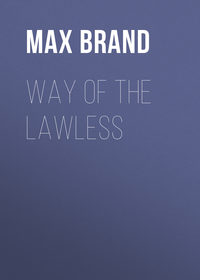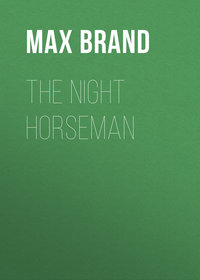 полная версия
полная версияRonicky Doone
The moment she was seated, he removed his spectacles, drew a chair close to hers and sat down, leaning far forward. "Now, my dear, foolish girl," said the master thief, smiling benevolently upon her, "what have you been doing tonight to make us all miserable?"
She knew at once that he was aware of every move she had made, from the first to the last. It gave her firmness to tell the lie with suavity. "It's a queer yarn, John," she said.
"I'm used to queer yarns," he answered. "But where have you been all this time? It was only to take five minutes, I thought."
She made herself laugh. "That's because you don't know Ronicky Doone, John."
"I'm getting to know him, however," said the master. "And, before I'm done, I hope to know him very well indeed."
"Well, he has a persuasive tongue."
"I think I noticed that for myself."
"And, when he told me how poor Bill Gregg had come clear across the continent—"
"No wonder you were touched, my dear. New Yorkers won't travel so far, will they? Not for a girl, I mean."
"Hardly! But Ronicky Doone made it such a sad affair that I promised I'd go across and see Bill Gregg."
"Not in his room?"
"I knew you wouldn't let him come to see me here."
"Never presuppose what I'll do. But go on—I'm interested—very. Just as much as if Ronicky Doone himself were telling me."
She eyed him shrewdly, but, if there were any deception in him, he hid it well. She could not find the double meaning that must have been behind his words. "I went there, however," she said, "because I was sorry for him, John. If you had seen you'd have been sorry, too, or else you would have laughed; I could hardly keep from it at first."
"I suppose he took you in his arms at once?"
"I think he wanted to. Then, of course, I told him at once why I had come."
"Which was?"
"Simply that it was absurd for him to stay about and persecute me; that the letters I wrote him were simply written for fun, when I was doing some of my cousin's work at the correspondence schools; that the best thing he could do would be to take my regrets and go back to the West."
"Did you tell him all that?" asked John Mark in a rather changed voice.
"Yes; but not quite so bluntly."
"Naturally not; you're a gentle girl, Caroline. I suppose he took it very hard."
"Very, but in a silly way. He's full of pride, you see. He drew himself up and gave me a lecture about deceiving men."
"Well, since you have lost interest in him, it makes no difference."
"But in a way," she said faintly, rising slowly from her chair, "I can't help feeling some interest."
"Naturally not. But, you see, I was worried so much about you and this foolish fellow that I gave orders for him to be put out of the way, as soon as you left him."
Caroline Smith stood for a moment stunned and then ran to him.
"No, no!" she declared. "In the name of the dear mercy of Heaven, John, you haven't done that?"
"I'm sorry."
"Then call him back—the one you sent. Call him back, John, and I'll serve you the rest of my life without question. I'll never fail you, John, but for your own sake and mine, for the sake of everything fair in the world, call him back!"
He pushed away her hands, but without violence. "I thought it would be this way," he said coldly. "You told a very good lie, Caroline. I suppose clever Ronicky Doone rehearsed you in it, but it needed only the oldest trick in the world to expose you."
She recoiled from him. "It was only a joke, then? You didn't mean it, John? Thank Heaven for that!"
A savagery which, though generally concealed, was never far from the surface, now broke out in him, making the muscles of his face tense and his voice metallic. "Get to your room," he said fiercely, "get to your room. I've wasted time enough on you and your brat of a brother, and now a Western lout is to spoil what I've done? I've a mind to wash my hands of all of you—and sink you. Get to your room, and stay there, while I make up my mind which of the two I shall do."
She went, cringing like one beaten, to the door, and he followed her, trembling with rage.
"Or have you a choice?" he asked. "Brother or lover, which shall it be?"
She turned and stretched out her hands to him, unable to speak; but the man of the sneer struck down her arms and laughed in her face. In mute terror she fled to her room.
Chapter Seventeen
Old Scars
In his room Bill Gregg was striding up and down, throwing his hands toward the ceiling. Now and then he paused to slap Ronicky Doone on the back.
"It's fate, Ronicky," he said, over and over again. "Thinking of waking up and finding the girl that you've loved and lost standing waiting for you! It's the dead come to life. I'm the happiest man in the world. Ronicky, old boy, one of these days I'll be able—" He paused, stopped by the solemnity of Doone's face. "What's wrong, Ronicky?"
"I don't know," said the other gloomily. He rubbed his arms slowly, as if to bring back the circulation to numbed limbs.
"You act like you're sick, Ronicky."
"I'm getting bad-luck signs, Bill. That's the short of it."
"How come?"
"The old scars are prickling."
"Scars? What scars?"
"Ain't you noticed 'em."
It was bedtime, so Ronicky Doone took off his coat and shirt. The rounded body, alive with playing muscles, was striped, here and there, with white streaks—scars left by healed wounds.
"At your age? A kid like you with scars?" Bill Gregg had been asking, and then he saw the exposed scars and gasped. "How come, Ronicky," he asked huskily in his astonishment, "that you got all those and ain't dead yet?"
"I dunno," said the other. "I wonder a pile about that, myself. Fact is I'm a lucky gent, Bill Gregg."
"They say back yonder in your country that you ain't never been beaten, Ronicky."
"They sure say a lot of foolish things, just to hear themselves talk, partner. A gent gets pretty good with a gun, then they say he's the best that ever breathed—that he's never been beat. But they forget things that happened just a year back. No, sir; I sure took my lickings when I started."
"But, dog-gone it, Ronicky, you ain't twenty-four now!"
"Between sixteen and twenty-two I spent a pile of time in bed, Bill, and you can lay to that!"
"And you kept practicing?"
"Sure, when I found out that I had to. I never liked shooting much. Hated to think of having a gent's life right inside the crook of my trigger finger. But, when I seen that I had to get good, why I just let go all holds and practiced day and night. And I still got to practice."
"I seen that," said Bill Gregg. "Every day, for an hour or two, you work with your guns."
"It's like being a musician," said Ronicky without enthusiasm. "I heard about it once. Suppose a gent works up to be a fine musician, maybe at the piano. You'd think, when he got to the top and knew everything, he could lay off and take things easy the rest of his life. But not him! Nope, he's got to work like a slave every day."
"But how come you felt them scars pricking as a bad-luck sign, Ronicky?" he asked after a time. "Is there anything that's gone wrong, far as you see?"
"I dunno," said Ronicky gravely. "Maybe not, and maybe so. I ain't a prophet, but I don't like having everything so smooth—not when they's a gent like the man with the sneer on the other end of the wire. It means he's holding back some cards on us, and I'd sure like to see the color of what he's got. What I'm going to work for is this, Bill: To get Caroline's brother, Jerry Smith, and rustle him out of town."
"But how can you do that when John Mark has a hold on him?"
"That's a pile of bunk, Bill. I figure Mark is just bluffing. He ain't going to turn anybody over to the police. Less he has to do with the police the happier he'll be. You can lay to that. Matter of fact, he's been loaning money to Caroline's brother. You heard her say that. Also, he thinks that Mark is the finest and most generous gent that ever stepped. Probably a selfish skunk of a spoiled kid, this brother of hers. Most like he puts Mark up as sort of an ideal. Well, the thing to do is to get hold of him and wake him up and pay off his debts to Mark, which most like run to several thousand."
"Several thousand, Ronicky? But where'll we get the money?"
"You forget that I can always get money. It grows on the bushes for me." He grinned at Bill Gregg.
"Once we get Jerry Smith, then the whole gang of us will head straight West, as fast as we can step. Now let's hit the hay."
Never had the mind of Ronicky Doone worked more quickly and surely to the point. The case of Jerry Smith was exactly what he had surmised. As for the crime of which John Mark knew, and which he held like a club over Jerry Smith, it had been purely and simply an act of self-defense. But, to Caroline and her brother, Mark had made it seem clear that the shadow of the electric chair was before the young fellow.
Mark had worked seriously to win Caroline. She was remarkably dexterous; she was the soul of courage; and, if he could once make her love her work, she would make him rich. In the meantime she did very well indeed, and he strengthened his hold on her through her brother. It was not hard to do. If Jerry Smith was the soul of recklessness, he was the soul of honor, also, in many ways. John Mark had only to lead the boy toward a life of heavy expenditures and gaming, lending him, from time to time, the wherewithal to keep it up. In this way he anchored Jerry as a safeguard to windward, in case of trouble.
But, now that Ronicky Doone had entered the tangle, everything was changed. That clear-eyed fellow might see through to the very bottom of Mark's tidewater plans. He might step in and cut the Gordian knot by simply paying off Jerry's debts. Telling the boy to laugh at the danger of exposure, Doone could snatch him away to the West. So Mark came to forestall Ronicky, by sending Jerry out of town and out of reach, for the time being. He would not risk the effect of Ronicky's tongue. Had not Caroline been persuaded under his very eyes by this strange Westerner?
Very early the next morning John Mark went straight to the apartment of his protégé. It was his own man, Northup, who answered the bell and opened the door to him. He had supplied Northup to Jerry Smith, immediately after Caroline accomplished the lifting of the Larrigan emeralds. That clever piece of work had proved the worth of the girl and made it necessary to spare no expense on Jerry. So he had given him the tried and proven Northup.
The moment he looked into the grinning face of Northup he knew that the master was not at home, and both the chief and the servant relaxed. They were friends of too long a term to stand on ceremony.
"There's no one here?" asked Mark, as a matter of form.
"Not a soul—the kid skipped—not a soul in the house."
"Suppose he were to come up behind the door and hear you talk about him like this, Northup? He's trim you down nicely, eh?"
"Him?" asked Northup, with an eloquent jerk of his hand. "He's a husky young brute, but it ain't brute force that I work with." He smiled significantly into the face of the other, and John Mark smiled in return. They understood one another perfectly.
"When is he coming back?"
"Didn't leave any word, chief."
"Isn't this earlier than his usual time for starting the day?"
"It is, by five hours. The lazy pup don't usually crack an eye till one in the afternoon."
"What happened this morning."
"Something rare—something it would have done your heart good to see!"
"Out with it, Northup."
"I was routed out of bed at eight by a jangling of the telephone. The operator downstairs said a gentleman was calling on Mr. Smith. I said, of course, that Mr. Smith couldn't be called on at that hour. Then the operator said the gentleman would come up to the door and explain. I told him to come ahead.
"At the door of the apartment I met as fine looking a youngster as I ever laid eyes on, brown as a berry, with a quick, straight look about the eyes that would have done you good to see. No booze or dope in that face, chief. He said—"
"How tall was he?" asked the chief.
"About my height. Know him?"
"Maybe. What name did he give?"
"Didn't give a name. 'I've come to surprise Jerry,' he says to me.
"'Anybody would surprise Jerry at this hour of the morning,'" says I.
"'It's too early, I take it?' says he.
"'About five hours,' says I.
"'Then this is going to be one of the exceptions,' says he.
"'If you knew Jerry better you wouldn't force yourself on him,' says I.
"'Son,' says this fresh kid—"
"Is this the way you talk to Smith?" broke in Mark.
"No, I can polish up my lingo with the best of 'em. But this brown-faced youngster was a card. Son,' he says to me, 'I'll do my own explaining. Just lead me to his dugout.'
"I couldn't help laughing. 'You'll get a hot reception,' says I.
"'I come from a hot country,' says he, 'and I got no doubt that Jerry will try to make me at home,' and he grinned with a devil in each eye.
"'Come in, then,' says I, and in he steps. 'And mind your fists,' says I, 'if you wake him up sudden. He fights sometimes because he has to, but mostly because it's a pleasure to him.'
"'Sure,' says he. 'That's the way I like to have 'em come.'"
"And he went in?" demanded John Mark.
"What's wrong with that?" asked Northup anxiously.
"Nothing. Go ahead."
"Well, in he went to Jerry's room. I listened at the door. I heard him call Jerry, and then Jerry groaned like he was half dead.
"'I don't know you,' says Jerry.
"'You will before I'm through with you,' says the other.
"'Who the devil are you?' asks Jerry.
"'Doone is my name,' says he.
"'Then go to the devil till one o'clock,' says Jerry. 'And come back then if you want to. Here's my time for a beauty sleep.'
"'If it's that time,' says Doone, 'you'll have to go ugly today. I'm here to talk.'
"I heard Jerry sit up in bed.
"'Now what the devil's the meaning of this?' he asked.
"'Are you awake?' says Doone.
"'Yes, but be hung to you!' says Jerry.
"Don't be hanging me,' says Doone. 'You just mark this day down in red—it's a lucky one for you, son.'
"'An' how d'you mean that?' says Jerry, and I could hear by his voice that he was choking, he was that crazy mad.
"'Because it's the day you met me,' says Doone; 'that's why it's a lucky one for you.'
"'Listen to me,' says Jerry, 'of all the nervy, cold-blooded fakers that ever stepped you're the nerviest.'
"'Thanks,' says Doone. 'I think I am doing pretty well.'
"'If I wanted to waste the time,' says Jerry, 'I'd get up and throw you out.'
"'It's a wise man,' says Doone, 'that does his talking from the other side of a rock.'
"'Well,' says Jerry, 'd'you think I can't throw you out?'
"'Anyway,' says Doone, 'I'm still here.'
"I heard the springs squeal, as Jerry went bouncing out of bed. For a minute they wrestled, and I opened the door. What I see was Jerry lying flat, and Doone sitting on his chest, as calm and smiling as you please. I closed the door quick. Jerry's too game a boy to mind being licked fair and square, but, of course, he'd rather fight till he died than have me or anybody else see him give up.
"'I dunno how you got there,' says Jerry, 'but, if I don't kill you for this later on, I'd like to shake hands with you. It was a good trick.'
"'The gent that taught me near busted me in two with the trick of it,' said Doone. 'S'pose I let you up. Is it to be a handshaking or fighting?'
"'My wind is gone for half an hour,' says Jerry, 'and my head is pretty near jarred loose from my spinal column. I guess it'll have to be hand-shaking today. But I warn you, Doone,' he says, 'someday I'll have it all out with you over again.'
"'Any time you mention,' says Doone, 'but, if you'd landed that left when you rushed in, I would have been on the carpet, instead of you.'
"And Jerry chuckles, feeling a pile better to think how near he'd come to winning the fight.
"'Wait till I jump under the shower,' says Jerry, 'and I'll be with you again. Have you had breakfast? And what brought you to me? And who the devil are you, Doone? Are you out of the West?'
"He piles all these questions thick and fast at Doone, and then I seen right off that him and Doone had made up to be pretty thick with each other. So I went away from the door and didn't listen any more, and in about half an hour out they walk, arm in arm, like old pals."
It was perfectly clear to John Mark that Ronicky had come there purposely to break the link between him and young Jerry Smith. It was perfectly plain why he wanted to do it.
"How much does Jerry owe me?" he asked suddenly.
The other drew out a pad and calculated for a moment: "Seven thousand eight hundred and forty-two," he announced with a grin, as he put back the pad. "That's what he's sold himself for, up to this time."
"Too much in a way and not enough in another way," replied John Mark. "Listen, if he comes back, which I doubt, keep him here. Get him away from Ronicky—dope him—dope them both. In any case, if he comes back here, don't let him get away. You understand?"
"Nope, but I don't need to understand. I'll do it."
John Mark nodded and turned toward the door.
Chapter Eighteen
The Spider's Web
Only the select attended the meetings at Fernand's. It was doubly hard to choose them. They had to have enough money to afford high play, and they also had to lose without a murmur. It made it extremely difficult to build up a clientele, but Fernand was equal to the task. He seemed to smell out the character of a man or woman, to know at once how much iron was in their souls. And, following the course of an evening's play, Fernand knew the exact moment at which a man had had enough. It was never twice the same for the same man. A rich fellow, who lost twenty thousand one day and laughed at it, might groan and curse if he lost twenty hundred a week later.
It was Fernand's desire to keep those groans and curses from being heard in his gaming house. He extracted wallets painlessly, so to speak.
He was never crooked; and yet he would not have a dealer in his employ unless the fellow knew every good trick of running up the deck. The reason was that, while Fernand never cheated in order to take money away from his customers, he very, very frequently had his men cheat in order to give money away.
This sounds like a mad procedure for the proprietor of a gaming house, but there were profound reasons beneath it. For one of the maxims of Fernand—and, like every gambler, he had many of them—was that the best way to make a man lose money is first of all to make him win it.
Such was Monsieur Frederic Fernand. And, if many compared him to Falstaff, and many pitied the merry, fat old man for having fallen into so hard a profession, yet there were a few who called him a bloated spider, holding his victims, with invisible cords, and bleeding them slowly to death.
To help him he had selected two men, both young, both shrewd, both iron in will and nerve and courage, both apparently equally expert with the cards, and both just as equally capable of pleasing his clients. One was a Scotchman, McKeever; the other was a Jew, Simonds. But in looks they were as much alike as two peas out of one pod. They hated each other with silent, smiling hatred, because they knew that they were on trial for their fortunes.
Tonight the Jew, Simonds, was dealing at one of the tables, and the Scotchman, McKeever, stood at the side of the master of the house, ready to execute his commissions. Now and again his dark eyes wandered toward the table where the Jew sat, with the cards flashing through his fingers. McKeever hungered to be there on the firing line! How he wished he could feel that sifting of the polished cardboard under his finger tips. They were playing Black Jack. He noted the smooth skill with which Simonds buried a card. And yet the trick was not perfectly done. Had he, McKeever, been there—
At this point he was interrupted by the easy, oily voice of M. Fernand. "This is an infernal nuisance!"
McKeever raised his eyebrows and waited for an explanation. Two young men, very young, very straight, had just come into the rooms. One he knew to be Jerry Smith.
"Another table and dealer wasted," declared M. Fernand. "Smith—and, by heavens, he's brought some friend of his with him!"
"Shall I see if I can turn them away without playing?" asked McKeever.
"No, not yet. Smith is a friend of John Mark. Don't forget that. Never forget, McKeever, that the friends of John Mark must be treated with gloves—always!"
"Very good," replied McKeever, like a pupil memorizing in class.
"I'll see how far I can go with them," went on M. Fernand. He went straight to the telephone and rang John Mark.
"How far should I go with them?" he asked, after he had explained that Smith had just come in.
"Is there someone with him?" asked John Mark eagerly.
"A young chap about the same age—very brown."
"That's the man I want!"
"The man you want?"
"Fernand," said Mark, without explaining, "those youngsters have gone out there to make some money at your expense."
M. Fernand growled. "I wish you'd stop using me as a bank, Mark," he complained. "Besides, it costs a good deal."
"I pay you a tolerable interest, I believe," said John Mark coldly.
"Of course, of course! Well"—this in a manner of great resignation—"how much shall I let them take away?"
"Bleed them both to death if you want. Let them play on credit. Go as far as you like."
"Very well," said Fernand, "but—"
"I may be out there later, myself. Good-by."
The face of Frederic Fernand was dark when he went back to McKeever. "What do you think of the fellow with Jerry Smith?" he asked.
"Of him?" asked McKeever, fencing desperately for another moment, as he stared at Ronicky Doone.
The latter was idling at a table close to the wall, running his hands through a litter of magazines. After a moment he raised his head suddenly and glanced across the room at McKeever. The shock of meeting glances is almost a physical thing. And the bold, calm eyes of Ronicky Doone lingered on McKeever and seemed to judge him and file that judgment away.
McKeever threw himself upon the wings of his imagination. There was something about this fellow, or his opinion would not have been asked. What was it?
"Well?" asked Frederic Fernand peevishly. "What do you think of him?"
"I think," said the other casually, "that he's probably a Western gunman, with a record as long as my arm."
"You think that?" asked the fat man. "Well, I've an idea that you think right. There's something about him that suggests action. The way he looks about, so slowly—that is the way a fearless man is apt to look, you know. Do you think you can sit at the table with Ronicky Doone, as they call him, and Jerry Smith and win from them this evening?"
"With any sort of luck—"
"Leave the luck out of it. John Mark has made a special request. Tonight, McKeever, it's going to be your work to make the luck come to you. Do you think you can?"
A faint smile began to dawn on the face of McKeever. Never in his life had he heard news so sweet to his ear. It meant, in brief, that he was to be trusted for the first time at real manipulation of the cards. His trust in himself was complete. This would be a crushing blow for Simonds.
"Mind you," the master of the house went on, "if you are caught at working—"
"Nonsense!" said McKeever happily. "They can't follow my hands."
"This fellow Doone—I don't know."
"I'll take the chance."
"If you're caught I turn you out. You hear? Are you willing to take the risk?"
"Yes," said McKeever, very pale, but determined.
At the right moment McKeever approached Jerry and Ronicky, dark, handsome, smoothly amiable. He was clever enough to make no indirect effort to introduce his topic. "I see that you gentlemen are looking about," he said. "Yonder is a clear table for us. Do you agree, Mr. Smith?"
Jerry Smith nodded, and, having introduced Ronicky Doone, the three started for the table which had been indicated.








